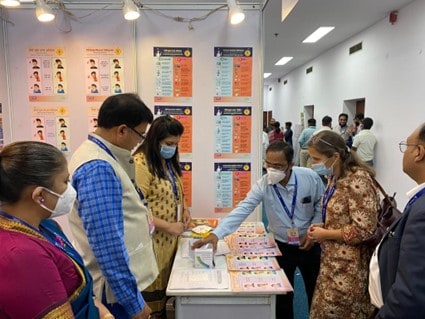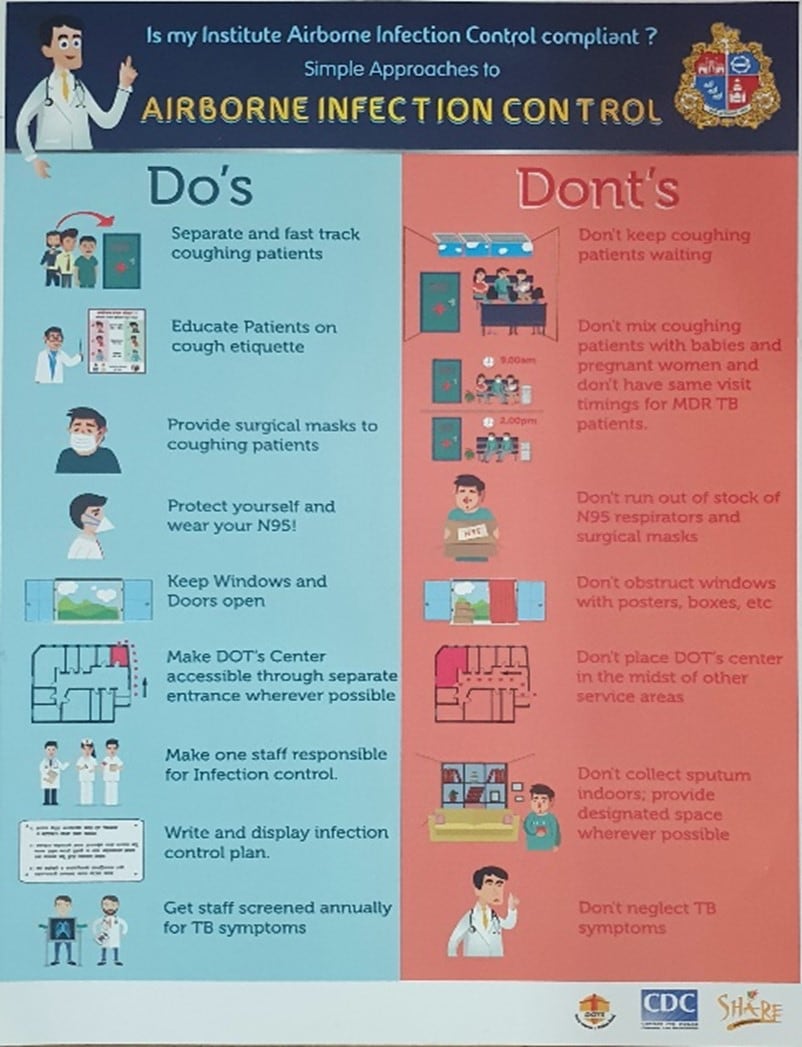A TB-Free India starts with stopping TB before it spreads

Globally, tuberculosis (TB) is the second leading cause of death from an infectious disease after COVID-19. In India, a country that accounts for one-fourth of the total global TB burden, the public health threat is felt acutely. However, increased infection prevention and control (IPC) measures are helping India reach its ambitious goal of eliminating the disease by 2025, ahead of the global 2030 goal.
IPC is Essential for Preventing Spread of TB
The importance of IPC measures in healthcare facilities was highlighted during the COVID-19 pandemic. IPC measures are essential to prevent and avoid the spread of TB and respiratory diseases to other patients and healthcare workers. The World Health Organization (WHO) End TB Strategy recommends IPC measures as critical components to curb the TB burden worldwide.
TB Mukt Bharat – Prioritizing IPC for TB Prevention in India
India’s National TB Elimination Program (NTEP) identified TB IPC measures as a critical strategy for eliminating TB. The U.S. Centers for Disease Control and Prevention (CDC), the U.S. Agency for International Development (USAID), the Society for Health Allied Research & Education India (SHARE INDIA), and NTEP together implemented the “TB Mukt Bharat (TB Free-India) Infection Prevention and Control” project as part of the larger initiative to bring the country one step closer to ending TB.
“TB causes the largest number of deaths among all other infectious diseases in our country. It is the duty of all citizens to give high priority to the ‘TB Mukt Bharat’ and to make this campaign a mass movement. Awareness about TB has to be created among the people. They have to be informed that prevention of this disease is possible,” stated Hon. President of India, Smt Droupadi Murmu.
The TB Mukt Bharat project supports adherence to IPC measures that can prevent transmission of TB in healthcare facilities, among healthcare workers, among household contacts of people with TB, and in the general community. The TB Mukt Bharat project is implemented by a multi-disciplinary team of administrators, IPC experts, microbiologists, nurses, program managers, and engineers who provide on-site training, mentorship, and routine assessments to strengthen and sustain IPC best practices.
IPC Training and Expansion
As a proof of concept in 2018, CDC supported the Municipal Corporation of Greater Mumbai in establishing an airborne infection control unit to support IPC training, quarterly healthcare facility assessments, and development of site-specific TB IPC plans. Following successful implementation in 10 administrative units, this model was replicated in all 24 administrative units in Mumbai. Based on the success of this effort in Mumbai, the Ministry of Health Central TB Division requested CDC to introduce and expand IPC practices across the country through the TB Mukt Bharat IPC project. CDC and partners developed and tested mentorship models, training curriculum based on CDC’s “Building and Strengthening Infection Control Strategies” (TB BASICS) program, toolkits, and awareness materials to build the capacity of healthcare facilities and achieve IPC compliance. Thanks to CDC’s continued collaboration, the TB Mukt Bharat IPC project has expanded to 189 healthcare facilities across 63 districts in 10 states in India, covering a population of 569 million people.
Using Technology to Support IPC Interventions
A user-friendly application was developed to support day-to-day implementation of IPC protocol and to support assessment of the TB Mukt Bharat project. The app collects information from the IPC checklist and display the data visually on dashboards. These dashboards track and monitor the progress of IPC activities and identify gaps and areas for improvement. The app is also less time-consuming – allowing a nurse to easily collect IPC information and upload photos. Data collected from this app was also used to establish healthcare facility baselines and follow-up assessments.
The CDC-SHARE-supported IPC teams have completed a baseline and two quarterly follow-up assessments based on the app data for 84 health facilities in 10 states where TB Mukt Bharat was implemented. This assessment found that over 1,000 key healthcare staff were trained in IPC guidelines and how to properly conduct a healthcare facility IPC assessment since December 2022.
“The TB Mukt Bharat IPC app played an important role in building the capacity and skills of the healthcare staff conducting assessments, recording, reporting, and monitoring the progress of activities using the dashboard. The use of technology for IPC will be crucial to scaling up IPC activities in the country,” said Dr. Rajesh Deshmukh, TB Public Health Specialist CDC India.

Significant Improvements in Implementation of IPC Protocol
Key indicators of IPC interventions increased significantly after one year of implementation of TB Mukt Bharat IPC activities. The 84 health facilities saw:
- Administrative controls, such as IPC plans, trained staff, posters, decongested waiting areas, and hallways, increased from 70% to 96%
- Biomedical waste management practices, such as color-coded bags, bins for segregation, and disposal of other waste materials like cups and gloves improved from 88% to 97%
- Environmental controls, such as appropriately keeping windows or doors open and ensuring appropriate air changes per hour, increased from 86% to 94%
- N95 respirator use by healthcare workers increased from 56% to 97%
- Fast tracking for persons with cough, fever, and respiratory symptoms presumptive TB (having cough, fever, and other respiratory symptoms) or persons with known TB disease cases increased from 59% to 94%
A Model for India and WHO
Given the demonstrated success of the TB Mukt Bharat project, the Government of India and NTEP have selected over 100 additional healthcare facilities to expand IPC and airborne measures. The project has strengthened the implementation of IPC interventions at healthcare facilities across India to prevent transmission of TB . Scaling up IPC interventions will not only contribute to India’s ambitious goal of ending TB by 2025 but will also
Additionally, the TB Mukt Bharat IPC project interventions and TB BASICS program toolkit have been showcased as country best practices in the “WHO operational handbook on tuberculosis infection prevention and control 2023” including the toolkit and TB IPC awareness material developed for the project.
While many countries saw years of TB progress reversed during the COVID-19 pandemic, countries like India that expanded TB IPC interventions in healthcare facilities experienced significant improvements, bringing the country closer to ending TB by 2025.